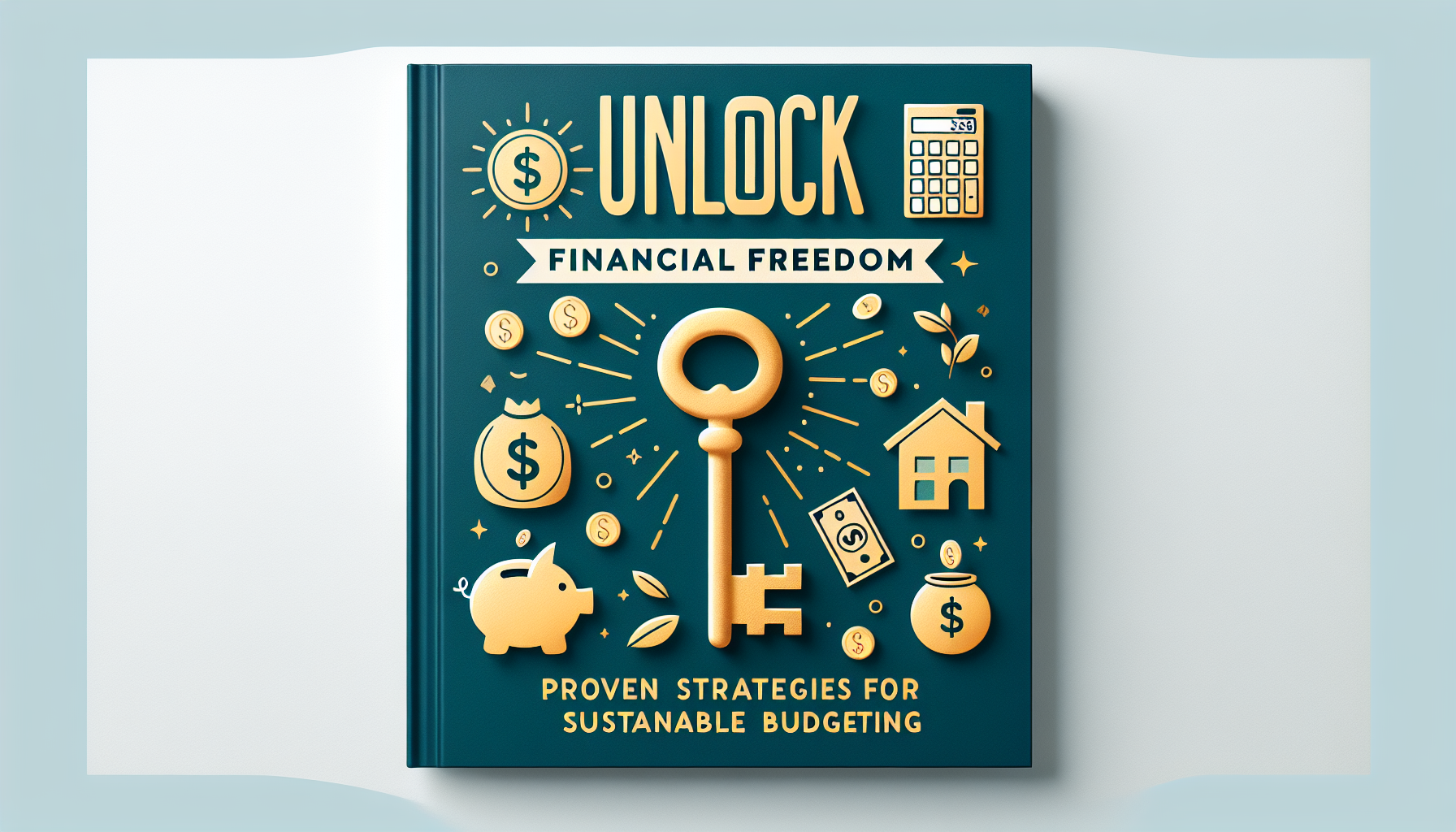Uncategorized
Unlock Financial Freedom: Proven Strategies for Sustainable Budgeting

Introduction to Sustainable Budgeting
Are you ready to take control of your financial future? Sustainable budgeting is not just about cutting back—it’s about creating a balanced plan that accommodates your needs and goals while paving the way for financial independence. In this guide, we’ll explore practical techniques to build a robust, adaptable budget that supports your lifestyle and aspirations.
Why Sustainable Budgeting Matters
Sustainable budgeting isn’t just a financial buzzword; it’s a transformative approach that encourages mindful spending and strategic saving. By implementing these strategies, you ensure that every dollar is purposefully allocated to support your present needs and future objectives.
Assessing Your Financial Situation
Before diving into budgeting, it’s crucial to have a clear understanding of your financial health. Start by analyzing your income streams, expenses, and existing obligations. This foundational step helps you create a realistic and responsive budget.
Setting Clear Financial Goals
Define your short-term and long-term financial goals. Whether it’s paying off debt, saving for a dream vacation, or planning for retirement, having specific targets will guide your budgeting process and keep you motivated.
Building Your Sustainable Budget
1. Categorize Your Expenses: Break down your spending into categories like necessities, savings, and discretionary expenses. This will help you understand where your money goes and identify potential areas for adjustment.
2. Implement the 50/30/20 Rule: Allocate 50% of your income to needs, 30% to wants, and 20% to savings or debt repayment. This framework provides a flexible yet disciplined approach to budgeting.
Adapting to Change
Life is constantly evolving, and your budget should, too. Regularly review and adjust your budget in response to changes in income, expenses, or financial goals. Flexibility is key to long-term sustainability.
Tools and Techniques for Budgeting Efficiency
Leverage modern technology to enhance your budgeting efforts. Utilize budgeting apps, digital planners, or financial software to track spending, set reminders, and monitor progress toward your financial goals.
Benefits of Automated Savings
Set up automated transfers to savings accounts to consistently fund your future. This hands-free approach ensures that saving becomes a regular, stress-free habit—helping you grow wealth over time.
Conclusion: Embracing Financial Empowerment
Building a sustainable budget is an empowering journey that requires commitment and adaptability. By following these strategies, you position yourself for financial success, stability, and peace of mind.
✅ Key Takeaways
- Assess your financial situation and set clear goals.
- Use the 50/30/20 rule to guide your spending and saving habits.
- Embrace technology to streamline and automate budgeting tasks.
FAQ
Q: What if my income is inconsistent?
A: Create a baseline budget for essential expenses and build a buffer fund during high-income months to cover periods of lower income.
Q: How can I stay motivated with long-term goals?
A: Break long-term goals into smaller, manageable milestones and celebrate each achievement to maintain motivation.
Q: What’s the best way to handle unexpected expenses?
A: Establish an emergency fund to cover unforeseen costs without derailing your budget.
Uncategorized
Mastering Financial Literacy: Empower Your Future Today!

Mastering Financial Literacy: Empower Your Future Today!
Financial literacy is more than just understanding numbers — it’s about making informed decisions that manifest in a secure and prosperous future. Whether you’re grappling with debt, learning how to budget effectively, or seeking ways to invest wisely, this guide is designed to empower you every step of the way.
Understanding Financial Literacy
Financial literacy encompasses the skills and knowledge that allow you to make informed and effective money-management decisions. It’s critical in developing responsible money habits and achieving financial independence.
Why Financial Literacy Matters
- Improves your ability to manage financial resources effectively for lifetime security.
- Enables informed financial decision-making.
- Enhances your ability to budget, save, and invest wisely.
Building a Budget That Works
Creating a budget is the cornerstone of financial stability. Follow these actionable steps to craft a budget that aligns with your goals and lifestyle:
Steps to Effective Budgeting
- Assess Your Income and Expenses: List all your income sources and monthly expenses. Be thorough!
- Set Clear Goals: Establish short-term and long-term financial goals. This will guide your budget priorities.
- Create a Plan: Allocate funds to each expense category, ensuring essential costs are covered first.
- Monitor and Adjust: Regularly review your budget and make adjustments as needed to meet your goals.
Strategies to Effectively Manage Debt
Debt can be a significant hurdle to financial freedom. Implement these strategies to manage and eliminate debt effectively:
Debt Reduction Techniques
- Debt Snowball Method: Pay off smallest debts first to build momentum.
- Debt Avalanche Method: Tackle high-interest debts first to minimize cost over time.
- Consider Consolidation: Streamline payments with a debt consolidation loan if it reduces interest rates and costs.
Investing for Long-term Wealth
Investing is a powerful tool for building wealth over time. Start early and consider these smart strategies:
Investment Tips
- Diversify Your Portfolio: Spread investments across different asset types to mitigate risk.
- Contribute Regularly: Set up automatic contributions to investment accounts.
- Educate Yourself: Continuously learn about markets and instruments to refine your strategy.
FAQs on Financial Literacy
- What is financial literacy and why is it important? Financial literacy involves understanding and using various financial skills effectively. It’s crucial for making sound financial decisions and achieving independence.
- How can I start learning about personal finance? Begin by reading articles, books, and taking online courses focused on budgeting, saving, and investing.
- What are some basic investing tips for beginners? Start with setting clear goals, learning about different investment vehicles, and considering working with a financial advisor if needed.
Mastering financial literacy is a journey. By applying these principles, you’ll not only gain control over your finances but also pave the path to a more secure and prosperous future. 💸
Uncategorized
SEO-optimized title that sparks curiosity and delivers value

Write a well-structured blog article of up to 5000 words, fully optimized for SEO. The content should be geared toward readers who want to improve their financial life — whether they’re paying off debt, learning how to budget, saving for the future, or exploring smart ways to invest and protect their income.
Focus on practical advice, responsible money habits, and easy-to-follow strategies that help people build lasting financial stability, regardless of their current income or experience.
⚙️ Apply SEO techniques:
Use
and
subheadings with the main keyword and natural variations
Include checkmark ✅ or bullet lists where helpful
End with a FAQ block answering real and common questions on the topic
Use emojis 💸📊🏡 where appropriate to keep the tone friendly and relatable
Make sure the article is accurate, up-to-date, and formatted in clean HTML. Maintain a clear, accessible, and empowering tone. Deliver content with authenticity, financial responsibility, and encouragement. Help the reader take control of their money, build confidence, and make informed decisions that support their future.
Uncategorized
Unlock Financial Success: Essential Personal Budgeting Strategies You Need to Know

Write a well-structured blog article of up to 5000 words, fully optimized for SEO. The content should be geared toward readers who want to improve their financial life — whether they’re paying off debt, learning how to budget, saving for the future, or exploring smart ways to invest and protect their income.
Focus on practical advice, responsible money habits, and easy-to-follow strategies that help people build lasting financial stability, regardless of their current income or experience.
⚙️ Apply SEO techniques:
Use
and
subheadings with the main keyword and natural variations
Include checkmark ✅ or bullet lists where helpful
End with a FAQ block answering real and common questions on the topic
Use emojis 💸📊🏡 where appropriate to keep the tone friendly and relatable
Make sure the article is accurate, up-to-date, and formatted in clean HTML. Maintain a clear, accessible, and empowering tone. Deliver content with authenticity, financial responsibility, and encouragement. Help the reader take control of their money, build confidence, and make informed decisions that support their future.
-

 Fashion8 anos ago
Fashion8 anos agoThese ’90s fashion trends are making a comeback in 2017
-

 Entertainment8 anos ago
Entertainment8 anos agoThe final 6 ‘Game of Thrones’ episodes might feel like a full season
-

 Fashion8 anos ago
Fashion8 anos agoAccording to Dior Couture, this taboo fashion accessory is back
-

 Entertainment8 anos ago
Entertainment8 anos agoThe old and New Edition cast comes together to perform
-

 Sports8 anos ago
Sports8 anos agoPhillies’ Aaron Altherr makes mind-boggling barehanded play
-

 Business8 anos ago
Business8 anos agoUber and Lyft are finally available in all of New York State
-

 Entertainment8 anos ago
Entertainment8 anos agoDisney’s live-action Aladdin finally finds its stars
-

 Sports8 anos ago
Sports8 anos agoSteph Curry finally got the contract he deserves from the Warriors



